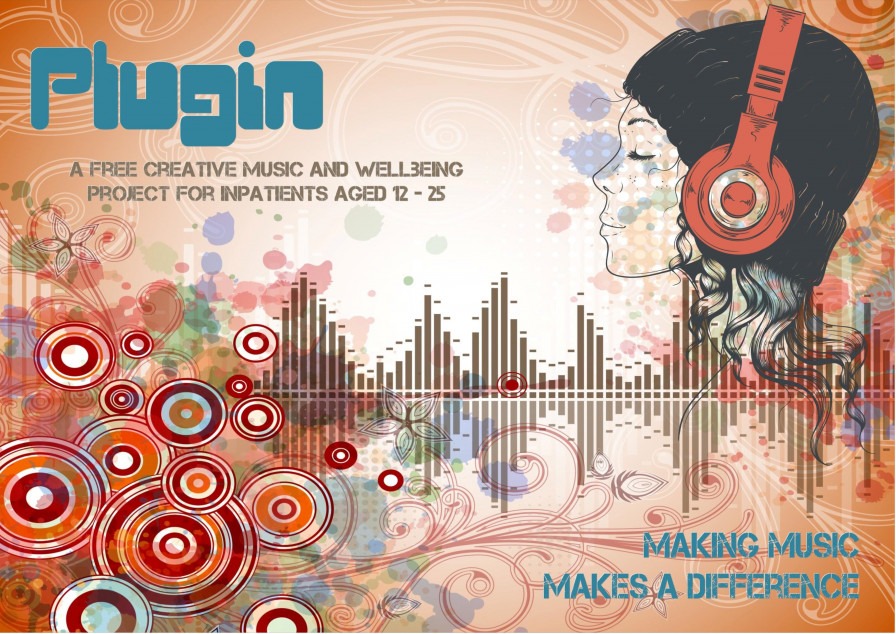Music, Identity, and Relationships by Chris Roberts (Young Music Leader on Quench Arts' Plugin project)

On applying to be a Young Music Leader on the Plugin project, I thought that I would learn a lot about music technology, lyric-writing, and mental health. I certainly have developed in these areas, but I have had other, far more profound learning experiences with wider-reaching impact in my daily life than I expected.
Through the experience of working in secure inpatient hospitals I have had the privilege of meeting and working closely with young people of a similar age to me, but whose paths would never have crossed mine in the wider world. Through making music together, many of them have been able to express themselves to me in ways that just wouldn’t happen if we met in another circumstance.
Take ‘A’. This participant almost never missed a session from day one. Whatever else was going on in the setting, A would be there, ready to learn the guitar, make beats, or record tracks. But in all that time, they hardly said a word, and never added lyrics to their tracks. One day, A walked into the session and took some rough sheets of paper out of their pocket. They were lyrics. We suggested having a practice run, but A would only perform once the record button was pushed. Feeling a combination of curiosity and excitement, we pressed record and sat back. In about 2 and a half minutes, A opened up about their mental health, problems from their youth, and struggles with faith/religion with a clarity and honesty that was as raw as it was deep.
This experience led me to think a lot about musical identity and relationships. From my perspective, the core aim of Plugin is to enable participants to express their identity in a safe space. To do that, a strong relationship between music lead and participant must be formed, which allows for a more honest musical expression, which strengthens the relationship, and so the cycle continues. But why is it important to be able to express your identity, especially in a secure inpatient setting?
Music therapist Even Ruud (1998, p. 31) notes that “[l]listening to, performing, and talking about music is not as much a reflection of identity as a way of performing our sense of ourselves, our identities.” This performance of identity is vital in the forming and strengthening of relationships, which are critical to our wellbeing. Indeed, much of our identity is built through relationships:
Although identity is in part distinct, differentiated self-hood, it is also an integration of relational contexts that profoundly shape, bound, and limit but also create opportunities for the emergent identity (Josselson, 1994, p. 89).
Consider, then, a young person who has been taken from their home, perhaps hundreds of miles away, and placed in an unfamiliar environment full of strangers. They have not only lost their independence and freedom, but a large chunk of their identity too. A big part of who they actually are. Music-making and lyric-writing therefore can be an invaluable tool to reconstruct that identity, exploring who you were, who you are now, and who you want to become.
Another participant, ‘B’, came from a life where violence was normal, and most people had access to a firearm. B was a talented rapper and beatmaker, but often found that their lyrical content put them at odds with the setting staff. At times, the staff saw B’s lyrics as glorifying gang violence and encouraged them to move away from these subjects.* B, on the other hand, just saw it as rapping about their life, their identity.
You can see the complications that begin to arise in situations like this. As a music leader, you want to encourage free, creative expression in an environment free from judgement. On the contrary, you are also there to aid with recovery process and to help the individual reintegrate with society. Acting like a censor is only going to damage the participant-led relationship but ignoring the content could let old habits persist.
What is clear is that the creative music making has allowed honest discussions and reflection to occur. This self-reflection often deepens and manifests itself in lyrics throughout the project, creating much more honest and meaningful work.
Through all these experiences, I have learnt that the role of ‘music leader’ is perhaps more accurately described as ‘relationship builder’. I have gained confidence both in myself and in meeting others where they are. Above all, I have realised the importance of expressing myself in my own life, and now have a stronger, relational identity as a result.
*I understand that some of different hospitals involved in the Plugin project have slightly different stances here (some are acute settings, some are forensic settings). Unless given specific briefings otherwise, Quench generally encourages open personal expression in sessions and ensure participants have copies of all tracks that they have made. However, they also encourage open discussions with participants to explain that some tracks, due to content, might not make the final public project CD/playlist without ‘radio edits’, either due to the language used, or because of personal or identifiable content. The compromise here is that the young person has the final track as they envisaged it but also has a choice regarding whether they want to make a track and content suitable for a younger audience and/or public dissemination.
References
Josselson, Ruthellen. "Identity and relatedness in the life cycle." (1994).
Ruud, Even. Music therapy: Improvisation, communication, and culture. Barcelona Publishers, 1998.
